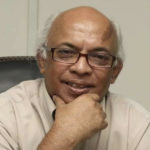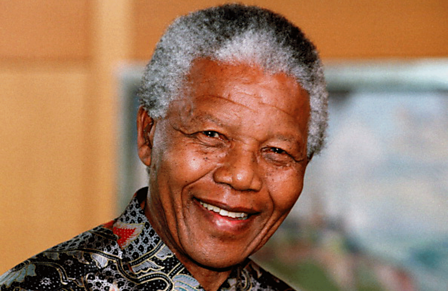Nelson Mandela: rainbow statesman
 Syed Badrul Ahsan
Syed Badrul Ahsan
In these dangerous, uncertain times we live through, the absence of Nelson Mandela only makes our circumstances a little more parlous than they have been so far. By the time he died, Mandela did not wield political authority, but there was about him a charisma that exuded moral power.
It was power that not all men, indeed not all politicians, can call forth in themselves. And because they cannot, they do not rise to the stature of statesmanship. Mandela was a statesman, the last in our times, in every sense of the meaning.
In all this talk of the statesman in Mandela, there comes alive the natural individual that resided somewhere inside him. Twenty seven years in prison are enough to break a man or radicalize him, enough to have him mutate into an individual removed from all signs of rationality.
In Mandela’s instance, it was precisely the opposite that happened. He transformed Robben Island into a schoolfor discourses on politics and philosophy with his fellow African National Congress prisoners. They were dedicated men, fiercely loyal to him and, more importantly, loyal to the cause of majority rule in South Africa.
But what gave Mandela a moral superiority above so many other politicians of his era was the dignity with which he carried himself in jail. He would not hate his jailers or even the government that had, to all intents and purposes, pushed him into a situation he could not possibly emerge from alive.
He was getting old in prison; his mother died and he was not permitted to be at her funeral. His son too died and yet the father in him was compelled to stay away from the last rites because the evil that was apartheid would not let him see his child’s coffin lowered into the grave.
Did that hurt? Of course it did, but Mandela would not have his emotions get in the way of his evolution into a philosophical man. He told off those jailers who deliberately tried humiliating him and yet he made sure that his anger did not slide into contempt.
Again, there were jailers to whom he explained why apartheid was bad, why the ANC was not a terrorist organization but a movement for the freedom of all South Africans. Those prison guards respected him, for his self-esteem and for the respect he gave them.
Prison often does wonderful things to politicians who find themselves pushed into it by insensitive, fearful governments. In prison, political leaders have time to reflect on the future, have those moments when they can within themselves shape strategy for the emancipation of their nations.
Prison mellowed Gandhi and gave Nehru the wherewithal to engage in intellectual pursuits and transformed Bangabandhu into a spokesman for his fellow Bengalis.
It did all these things for Mandela. What prison deprived Mandela of was the love he could have, like any other man, shared with his family. His children grew into adulthood in his absence; his wife Winnie spent years in her own torment caused by the white supremacist regime.
There was the fundamentally human that defined the Mandela personality. He was a romantic man and appreciated the beauty of women. His first marriage was a result of love. And then he met Winnie, married her and gave her children. That love came to an end soon after his re-emergence into freedom in 1990, which again was proof that like other men whose lovers turn their backs on them he could feel his heart crack.
Winnie’s romantic links with other men did not embitter him, though. He did what a man in love and suffused in the principles of idealism does: he put the marriage to a peaceful end.
And then he found a new, more mature and composed love in Graca Machel, the widow of the late Mozambique leader Samora Machel. In his final years, Mandela saw his love life, its romance and its idealism, gravitate to an intellectual plane in Graca Machel’scompany. They were made for each other.
A whole world changed in the twenty seven years Mandela spent in prison. When he was arrested by Pretoria’s security forces in 1962, Harold Macmillan presided over Britain’s political fortunes. Two years later, in late 1964, Winnie wrote to him to inform him that Britain’s Labour Party, led by Harold Wilson, had come to power.
This letter would not be given to him by his jailers until 1980, when Margaret Thatcher was in office at Downing Street, Ronald Reagan was about to win the White House and Francois Mitterrand was clearly headed for the Elysee Palace.
In all these twenty seven years, the world had absolutely no idea of how Mandela looked, how different he was physically from the robust young politician who disappeared behind the high walls of incarceration in the early 1960s. Not until February 1990, when he walked into freedom, would the world have a fresh new sighting of him.
It was the statesman Mandela who returned to the world of the living in 1990. He got down to business in a manner that suggested he had never been out of touch with it. He worked with FW de Klerk on a new constitution; he let people everywhere know that South Africa’s rugby team, all-white in the apartheid era, would remain the country’s pride.
He travelled to other lands, letting their leaders and people know that his rainbow nation, turning its back on reprisal and recrimination, was on its way to being a society of inclusiveness through being an amalgam of black, white and coloured. He took charge as president, served a single term and then let a new generation take over.
That was Nelson Rolilahla Mandela. In another day and age, he would be a prophet or a philosopher. And yet he was both, in the way he observed the world before stamping his moral authority on it, in our times.
(Nelson Mandela was born on 18 July 1918 and passed away on 5 December 2013)
(Syed Badrul Ahsan: contributing columnist, Shottobani)

